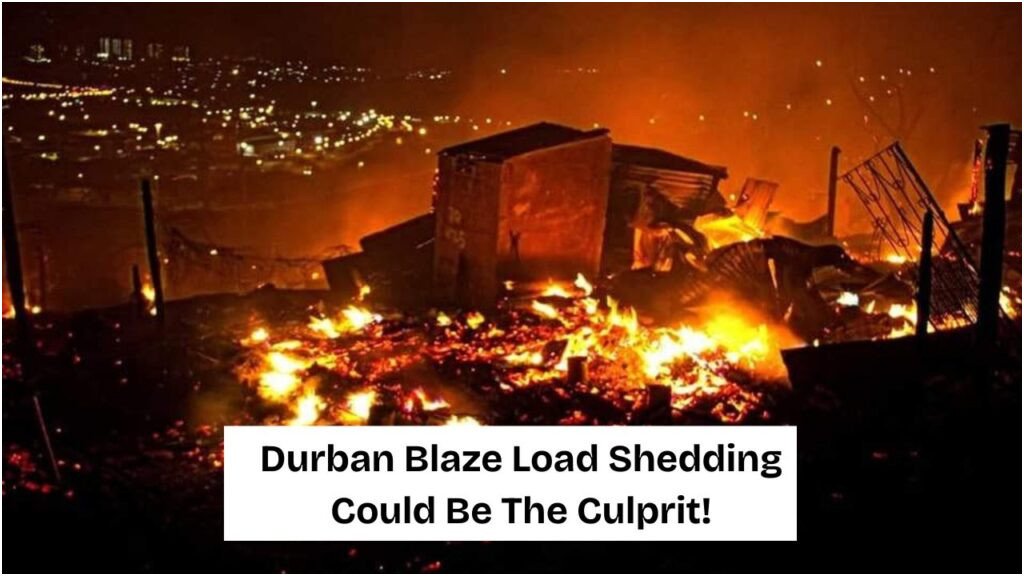Durban Supermarket Blaze Linked to Load Shedding: On a typical bustling day in Durban, shoppers were met with an unexpected disaster as a raging fire engulfed a local supermarket. The blaze, which has been tentatively linked to the ongoing load shedding crisis in South Africa, has raised significant concern among residents and officials alike. As the country grapples with frequent power cuts, the impact is being felt in the most unexpected ways, highlighting the urgent need for a sustainable solution.
Emergency Response to Durban Supermarket Fire
The response to the Durban supermarket fire was swift and efficient, with emergency services arriving on the scene promptly. Firefighters worked tirelessly to contain the blaze and prevent it from spreading to nearby structures. The situation was challenging due to the dense urban environment and the supermarket’s proximity to residential areas. The quick actions taken by the emergency teams were crucial in ensuring the safety of the public and minimizing property damage.
- Fire containment efforts
- Evacuation procedures
- Coordination with local authorities
- Use of advanced firefighting equipment
- Community support and response
- Medical assistance for affected individuals
- Investigation into the cause of the fire
- Public safety advisories issued
Load Shedding: A Persistent Challenge
Load shedding has long been a contentious issue in South Africa, affecting businesses and households alike. The recurring power outages have not only disrupted daily life but have also posed significant risks to safety and security. In the case of the Durban supermarket blaze, the suspected link to load shedding underscores the broader implications of the energy crisis.
| Year | Load Shedding Events | Impact on Businesses |
|---|---|---|
| 2020 | Frequent | Severe |
| 2021 | Moderate | Moderate |
| 2022 | Increased | High |
| 2023 | Frequent | Severe |
Investigation Into the Durban Fire Incident
Authorities have launched a comprehensive investigation into the cause of the supermarket fire. Preliminary reports suggest that an electrical fault, possibly exacerbated by load shedding, may have triggered the blaze. Investigators are meticulously examining the scene to gather evidence and determine the exact sequence of events leading to the fire.
- Examination of electrical systems
- Interviews with eyewitnesses
- Analysis of CCTV footage
- Collaboration with energy experts
Community Impact and Safety Measures
The fire has had a profound impact on the Durban community, prompting discussions on safety measures and preparedness. Residents are calling for improved infrastructure and reliable power supply to prevent such incidents in the future. The need for robust safety protocols and community awareness campaigns has become apparent.
- Increased community awareness
- Calls for government intervention
- Strengthening of local safety protocols
Lessons Learned from the Incident
The Durban supermarket blaze serves as a stark reminder of the vulnerabilities faced by communities amidst the load shedding crisis. Key lessons from the incident highlight the importance of infrastructure resilience, effective emergency response, and proactive safety measures.
- Need for infrastructure upgrades
- Importance of emergency preparedness
- Strategic community engagement
Government Response and Future Plans
In response to the incident, government officials have reiterated their commitment to addressing the load shedding issue. Plans are underway to explore alternative energy sources and improve the country’s power grid to reduce dependence on load shedding and enhance public safety.
- Exploration of renewable energy options
- Investment in power grid enhancements
- Policy reforms for energy sustainability
Economic Implications of Load Shedding
The economic ramifications of load shedding are far-reaching, affecting not only businesses but also the broader economy. Companies are grappling with increased operational costs and reduced productivity, leading to a ripple effect on the job market and overall economic growth.
| Sector | Impact | Response Strategies | Outcome | Future Outlook |
|---|---|---|---|---|
| Retail | High | Cost-cutting | Reduced Profits | Uncertain |
| Manufacturing | Severe | Operational Shifts | Delayed Production | Challenging |
| Services | Moderate | Adaptation | Limited Growth | Stable |
FAQ Section
What caused the supermarket fire in Durban?
The fire is suspected to have been caused by an electrical fault linked to load shedding.
How did emergency services respond to the blaze?
Emergency services responded swiftly, containing the fire and ensuring public safety.
What are the implications of load shedding in South Africa?
Load shedding leads to economic disruptions, safety risks, and increased operational costs for businesses.
What measures are being taken to prevent future incidents?
Authorities are investigating alternative energy sources and enhancing infrastructure resilience.
How can communities prepare for such emergencies?
Communities can improve emergency preparedness through awareness campaigns and safety protocols.





